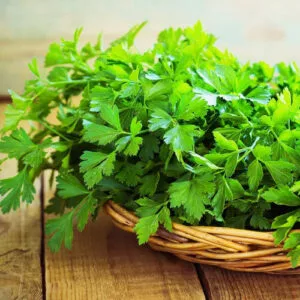Parsley Seeds (10 seeds)
₹35.0
Parsley is a very attractive plant that is generally grown as a culinary herb but often wasted as a garnish or plate decoration. Considering it adds more freshness than flavor to dishes, it is best used fresh and added at the end of cooking, giving home cooks all the more reason to grow their own. Try our Non-GMO Parsley Seeds. Also, check out our workshops for more details.
PRODUCT DESCRIPTION
Number of seeds in a packet – 10
PLANT DESCRIPTION
- Difficulty Level – moderately difficult
- Plant Height – 9 – 12 inches tall
- Type – indoor (balcony/ terrace) or outdoor
- Aroma – mild grassy smell
- Flavor – earthy peppery flavor
- Feed – Vermicompost for nutrients every week, Seaweed once a month for greener leaves, and Epsom salt for better blooming once a month
- Watering – 2 – 3 times a week
- Sunlight – 6 – 8 hours of sunlight per day
- Germination Time – 14 – 30 days
- Suitable Temperature – 50°F – 70°F
- Season – biennial
- Sowing – march – april
HOW TO GROW PARSLEY FROM SEEDS
- Soak the seeds in warm water overnight before planting.
- Take a Growbag and fill it with Cocopeat.
- Sprinkle the seeds around the Growbag.
- Leave the seeds uncovered as they need light for germination and spray water.
- Water 2 – 3 times a week.
- Seeds will germinate within 14 – 30 days.
- Full sunlight is needed.
ALTERNATE METHOD
- Take a Medium Size Pot and add a Potting Mix.
- If planting in the soil adds Neem Cake Powder, Vermicompost, and Seaweed.
ALTERNATE NAME
Botanical name: Petroselinum crispum
parsley seed in hindi: ajamod beej (अजमोद बीज)
parsley seed in tamil: vokkocu vitai (வோக்கோசு விதை)
parsley seed in telugu: parsli sid (పార్స్లీ సీడ్)
parsley seed in kannada: parsli bija (ಪಾರ್ಸ್ಲಿ ಬೀಜ)
parsley seed in marathi: ajamoda (ova) biyane (अजमोदा (ओवा) बियाणे)
parsley seed in malayalam: aaraanavo vithu (ആരാണാവോ വിത്ത്)
Other names: Garden parsley
You must be logged in to post a review.
Q & A
Organic herbal seeds can contribute to sustainability in several ways. Here are some key aspects of their sustainability:
Environmental Benefits: Organic farming practices used to produce herbal seeds prioritize ecological balance and minimize harm to the environment. Organic farmers avoid using synthetic pesticides, herbicides, and genetically modified organisms (GMOs). By eliminating these inputs, organic farming helps reduce chemical pollution, soil degradation, and biodiversity loss. It also promotes the preservation of natural resources like water and soil.
Preservation of Genetic Diversity: Organic herbal seed production often emphasizes the use of heirloom or open-pollinated varieties. These seeds are typically more diverse genetically, which helps preserve biodiversity and protect against crop monocultures. Maintaining a wide range of genetic diversity enhances the resilience of plant populations, making them less vulnerable to pests, diseases, and environmental changes.
Health Benefits: Organic herbal seeds are grown without synthetic chemicals, making them a healthier option for both consumers and farmers. Avoiding pesticides and other chemicals reduces the risk of exposure to potentially harmful substances. Organic herbs are typically free from residues of synthetic fertilizers, pesticides, and herbicides, which can be present in conventionally grown plants.
Support for Organic Farming Communities: The demand for organic products, including herbal seeds, supports organic farming communities around the world. Choosing organic herbal seeds encourages sustainable agricultural practices, helps small-scale farmers, and promotes fair trade. Organic farming methods often prioritize fair labor practices, community development, and sustainable livelihoods for farmers.
Seed Saving and Adaptation: Organic herbal seed producers often engage in seed-saving practices, which involves preserving and sharing seeds from year to year. This promotes seed adaptation to local conditions and reduces dependence on commercial seed suppliers. By encouraging seed saving and exchange, organic herbal seed production contributes to long-term sustainability and resilience in the agricultural system.
Consumer Awareness and Education: The cultivation and availability of organic herbal seeds can raise consumer awareness about the importance of sustainable farming practices. As more people seek out organic options, it creates a market demand that incentivizes sustainable agricultural practices. Education about organic farming methods and the benefits of organic products helps foster a more sustainable food system.
Overall, organic herbal seeds offer numerous sustainability benefits, including reduced environmental impact, genetic diversity preservation, improved human health, support for farming communities, seed adaptation, and consumer education. By choosing organic options, individuals can contribute to a more sustainable and resilient agricultural system.
General Inquiries
There are no inquiries yet.



















Reviews
There are no reviews yet.